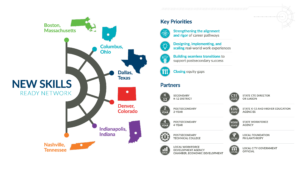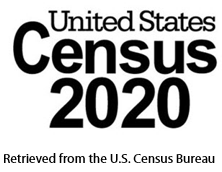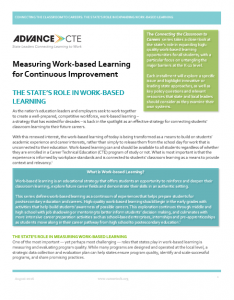Advance CTE’s “Research Round-Up” blog series features summaries of relevant research reports and studies to elevate evidence-backed Career Technical Educational (CTE) policies and practices and topics related to college and career readiness. This month’s blog highlights the different data sources that can be leveraged to identify and address any inequities that are present in postsecondary CTE programs. These findings align with Advance CTE’s vision for the future of CTE where each learner feels welcomed and has the means to succeed in the career preparation ecosystem.
![]() Credential Engines’ Equity Advisory Council (EAC) report, and the subsequent recommendations, present a tiered approach for using data to ensure that CTE programs are equitable for all learners.
Credential Engines’ Equity Advisory Council (EAC) report, and the subsequent recommendations, present a tiered approach for using data to ensure that CTE programs are equitable for all learners.
Overview
The primary questions that this report sought to address were twofold:
- What are the data points that students and workers need to know–and that providers should make public–in order to make their most informed decisions about whether a program and credential can lead to an equitable outcome for them?
- Which data use principles should be incorporated into counseling, guidance, navigation and pathway tools and services to ensure that data are the most effective for students and workers to achieve their most equitable outcomes?
This report groups data into three tiers based on the complexity level to analyze or publish the data.
- Tier 1: These are data points that all providers should be able to analyze and publish now.
- EX: Compliance data, enrollment, completion, etc.
- Tier 2: These are data points that all providers should be actively working on being able to analyze and publish.
- EX: Credential transparency, financial return on investment, placement information, etc.
- Tier 3: These are data points that point to where the field is headed, and providers should be assessing how to build capacity to analyze and publish them.
- EX: Transfer and credit mobility, support and tutoring services, labor market alignment of the credentials that learners are earning, etc.
These “critical equity data points” are important to track in order to advance understanding and action about equitable pathways, transfer and recognition of learning. While each consecutive tier may require more in-depth analysis, this work will be critical in building a complete understanding of the learner experience and learner outcomes in these pathways.
Recommendations
In their report, the EAC also identified key principles to help maintain equitable data practices. These included:
- Adopt data practices to foster an environment where outcomes are improved for every learner
- Disaggregate data (such as program’s earnings and employment outcomes) through publically available channels
- Emphasize credentials of value that are relevant for learners
- Consider learner voice and need when designing tools to ensure data is accessible and inclusive
- Provide professional development for those interacting with the data, and leveraging the value of linked open data
These principles rely on a statewide commitment (inclusive of workforce, industry, educational institutions, and government leadership) to making data accessible to ensure that every learner has the opportunity and information required to make the best decision about their career trajectory.
Advance CTE’s Career Readiness Data Quality and Use Policy Benchmark Tool also supports state leaders’ use of accurate, timely, and disaggregated data to investigate barriers to access and take action to ensure equity, access and success for historically marginalized learners.
To access additional resources on data quality and use, please visit Advance CTE’s Learning that Works Resource Center.
Amy Hodge, Membership & Policy Associate




 census. The census is pivotal to understanding the composition of the country, but it also plays a large role in federal funding levels of major programs. In fact, the U.S. Census Bureau reported that education programs are some of the biggest to use census data to determine funding. For example, the Pell Grant program utilizes census data and was allotted $29.8 billion dollars in 2015.
census. The census is pivotal to understanding the composition of the country, but it also plays a large role in federal funding levels of major programs. In fact, the U.S. Census Bureau reported that education programs are some of the biggest to use census data to determine funding. For example, the Pell Grant program utilizes census data and was allotted $29.8 billion dollars in 2015. Work-based learning provides a continuum of activities — from career exploration and job shadowing to internships and apprenticeships — that help students develop technical and professional skills in an authentic work environment. While many work-based learning programs are designed and operated at the local level, several states have begun building a data collection and evaluation strategy to ensure program quality, identify and scale successful programs, and share promising practices. To support state efforts in this work, Advance CTE today released a brief that explores strategies for measuring work-based learning.
Work-based learning provides a continuum of activities — from career exploration and job shadowing to internships and apprenticeships — that help students develop technical and professional skills in an authentic work environment. While many work-based learning programs are designed and operated at the local level, several states have begun building a data collection and evaluation strategy to ensure program quality, identify and scale successful programs, and share promising practices. To support state efforts in this work, Advance CTE today released a brief that explores strategies for measuring work-based learning.